Pharmaceutical giant Novartis announced drastic and fruitful measures to
combat three killer parasites that affect millions of people worldwide. After screening a whopping 3 million chemical compounds, they landed on a single drug that can kill parasites causing sleeping sickness, Chagas disease, and Leishmaniasis.

"What makes it special is the fact it is targeting all three parasites. That's the first time it has been done, so it is quite special,” said Elmarie Myburgh, co-author of the study published as a Letter in Nature.
Worldwide, around 20 million people are affected with sleeping sickness (via Trypanosoma brucei), Chagas disease (via Trypansosoma cruzi), and Leishmaniasis (via Leishmania). All three parasites share similar biology and genomic sequence, which prompted the quest for a common drug.
Indeed, scientists from the Genomics Institute of the Novartis Research Foundation combed through 3 million compounds – no small feat by any stretch of the imagination. Their persistence paid off when they finally found one compound that killed multiple parasites in the lab. Known as GNF6702 for now, the drug targets the parasites’ proteasomes – structures that chew up and recycle damaged or waste proteins in the cells.
Even if it can kill all the parasites, a drug is no good if it also kills the host cells indiscriminately. Luckily, in experiments, the team showed the drug inhibits the parasites’ proteasomes without affecting those of mammalian cells.
With modifications, the drug was made even more potent – 20 times more potent to be exact. But this seemed to be tolerated with no problem in mice, giving hope that pre-clinical and clinical trials will also show promising results.
"To me this is obviously a big deal, I'm in this field to try and make a difference, to get to a cure, and we're working hard in the hope that it gets to patients,” said Myburgh. "There's been very little incentive to spend a lot of money on these diseases as they affect a very poor, and yet large, population."
Drugs that are available currently to combat these infections have big limitations. Chief among them are cost, ease of use, and toxicity. That GNF6702 may overcome these limitations and treats three diseases simultaneously gives great hope to the millions of people affected and millions more at risk for these diseases.
Additional source:
Genomics Institute of the Novartis Research Foundation,
BBC
 "What makes it special is the fact it is targeting all three parasites. That's the first time it has been done, so it is quite special,” said Elmarie Myburgh, co-author of the study published as a Letter in Nature.
"What makes it special is the fact it is targeting all three parasites. That's the first time it has been done, so it is quite special,” said Elmarie Myburgh, co-author of the study published as a Letter in Nature.







